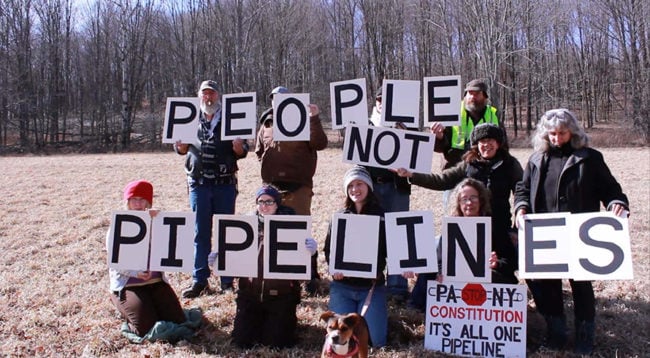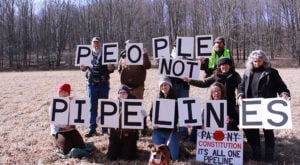FERC decision deals major blow to Constitution Pipeline

View more images on our Flickr site
 In another decisive loss for Constitution Pipeline Co LLC, the Federal Energy Regulatory Commission declined to overrule New York State’s denial of a key certification for Constitution Pipeline, a pipeline that would have carried fracked natural gas across 251 waterbodies from Pennsylvania to the Hudson River Valley. Represented by Earthjustice, Riverkeeper had intervened in the administrative proceeding in opposition to the pipeline.
In another decisive loss for Constitution Pipeline Co LLC, the Federal Energy Regulatory Commission declined to overrule New York State’s denial of a key certification for Constitution Pipeline, a pipeline that would have carried fracked natural gas across 251 waterbodies from Pennsylvania to the Hudson River Valley. Represented by Earthjustice, Riverkeeper had intervened in the administrative proceeding in opposition to the pipeline.
Under the Clean Water Act, New York State has authority to determine whether construction or operation of a pipeline will violate state water quality standards and approve, condition or deny a “Water Quality Certification.” The provision of the law setting how long New York State has to make the decision is ambiguous, but the stakes are high. If the state waits too long, the state may be deemed to have waived its authority. FERC’s decision to uphold New York’s denial of the Water Quality Certification confirms that the state has one year from submission of a complete application to make that decision. In addition, FERC found that Constitution Pipeline voluntary withdrawal and resubmission of its application had twice restarted the clock. Unlike the Valley Lateral Case, discussed below, this case does not raise whether an incomplete application starts the clock ticking.
This decision follows a string of legal victories against Constitution Pipeline. In August 2017, the United States Court of Appeals for the Second Circuit dismissed Constitution Pipeline Co’s lawsuit challenging New York State’s initial denial of the Water Quality Certification. In October 2017, the same court declined to rehear the case.
FERC’s determination to set a clear, one-year timeframe for state authority to deny or condition Water Quality Certifications is a crucial win not just for the Hudson River and New York State, but for all states and communities around the country that seek to prevent major gas infrastructure projects from harming them, their waters and their climate. States have been clamoring for greater certainty about the time period for waiver and now have it.
In a separate pipeline case, Riverkeeper, again represented by Earthjustice, is opposing the Valley Lateral Pipeline. We are continuing to fight to ensure that the waiver period begins not when the pipeline developers send their initial application materials, but instead when states have deemed that there is enough information to adequately review the permit. Only through protecting and exercising these authorities will New York be able to stop the build out of fossil fuel infrastructure and turn the page to meet its clean energy goal of 50 percent renewable energy by 2030.
